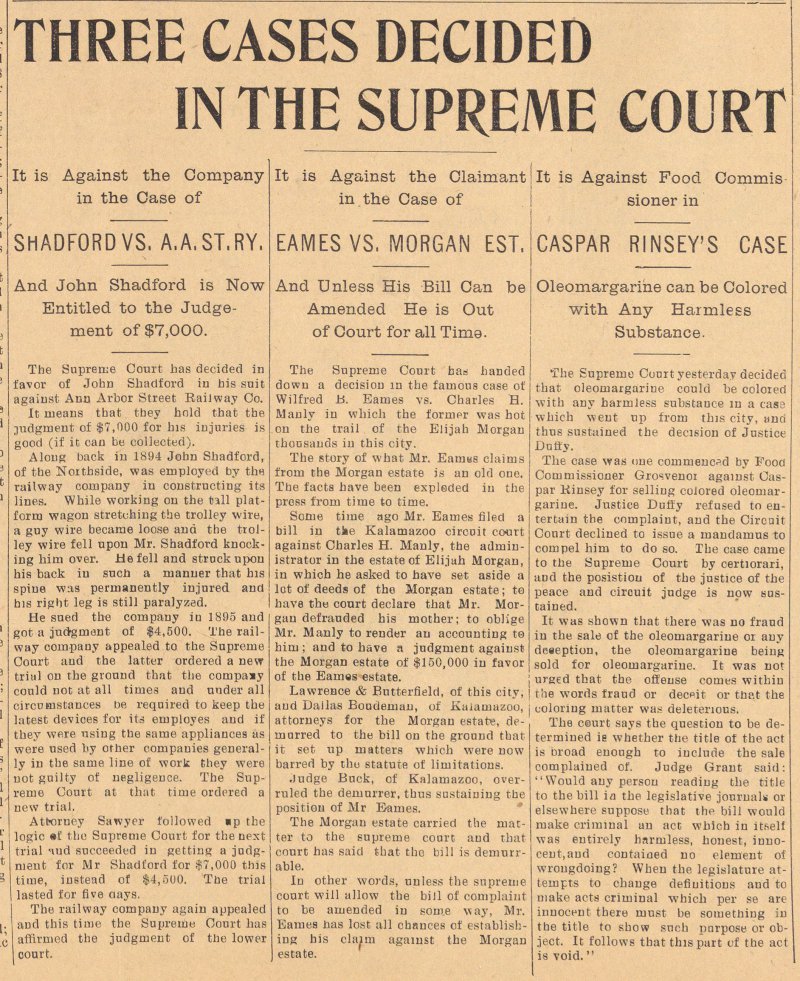Three Cases Decided In The Supreme Court

THREE CASES DECIDED IN THE SUPREME COURT
It is Against the Company in the Case of
SHADFORD VS. A. A. ST. RY.
And John Shadford is Now Entitled to the Judgement of $7,000.
The Supreme Court has decided in favor of John Shadford in his suit against Ann Arbor Street Railway Co.
It means that they hold that the judgment of $7,000 for his injuries is good (if it can be collected).
Along back in 1894 John Shadford, of the Northside, was employed by the railway company in constructing its lines. While working on the tall platform wagon stretching the trolley wire, a guy wire became loose and the trolley wire fell upon Mr. Shadford knocking him over. He fell and struck upon his back in such a manner that his spine was permanently injured and his right leg is still paralyzed.
He sued the company in 1895 and got a judgment of $4,500. The railway company appealed to the Supreme Court and the latter ordered a new trial on the ground that the company could not at all times and under all circumstances be required to keep the latest devices for its employes and if they were using the same appliances as were used by other companies in the same line of work they were not guilty of negligence. The Supreme Court at that time ordered a new trial.
Attorney Sawyer followed up the logic of the Supreme Court for the next trial and succeeded in getting a judgment for Mr. Shadford for $7,000 this time, instead of $4,500. The trial lasted for five days.
The railway company again appealed and this time the Supreme Court has affirmed the judgment of the lower court.
It is Against the Claimant in the Case of
EAMES VS. MORGAN EST.
And Unless His Bill Can be Amended He is Out of Court for all Time.
The Supreme Court has handed down a decision in the famous case of Wilfred B. Eames vs. Charles H. Manly in which the former was hot on the trail of the Elijah Morgan thousands in this city.
The story of what Mr. Eames claims from the Morgan estate is an old one. The facts have been exploded in the press from time to time.
Some time ago Mr. Eames filed a bill in the Kalamazoo circuit court against Charles H. Manly, the administrator in the estate of Elijah Morgan, in which he asked to have set aside a lot of the deeds of the Morgan estate; to have the court declare that Mr. Morgan defrauded his mother; to oblige Mr. Manly to render an accounting to him; and to have a judgment against the Morgan estate of $150,000 in favor of the Eames estate.
Lawrence & Butterfield, of this city, and Dallas Boudeman, of Kalamazoo, attorneys for the Morgan estate, demurred to the bill on the ground that it set up matters which were now barred by the statute of limitations.
Judge Buck, of Kalamazoo, overruled the demurrer, thus sustaining the position of Mr. Eames.
The Morgan estate carried the matter to the supreme court and that court has said that the bill is demurrable.
In other words, unless the supreme court will allow the bill of complaint to be amended in some way, Mr. Eames has lost all chances of establishing his claim against the Morgan estate.
It is Against Food Commissioner in
CASPAR RINSEY'S CASE
Oleomargarine can be Colored with Any Harmless Substance.
The Supreme Court yesterday decided that oleomargarine could be colored with any harmless substance in a case which went up from this city, and thus sustained the decision of Justice Duffy.
The case was on commenced by Food Commissioner Grosvenor against Caspar Rinsey for selling colored oleomargarine. Justice Duffy refused to entertain the complaint, and the Circuit Court declined to issue a mandamus to compel him to do so. The case came to the Supreme Court by certiorari, and the position of the justice of the peace and circuit judge is now sustained.
It was shown that there was no fraud in the sale of the oleomargarine or any deception, the oleomargarine being sold for oleomargarine. It was not urged that the offense comes with in the words fraud or deceit or that the coloring matter was deleterious.
The court says the question to be determined is whether the title of the act is broad enough to include the sale complained of. Judge Grant said: "Would any person reading the title to the bill in the legislative journals or elsewhere suppose that the bill would make criminal an act which itself was entirely harmless, honest, innocent, and contained no element of wrongdoing? When the legislature attempts to change definitions and to make acts criminal which per se are innocent there must be something in the title to show such purpose or object. It follows that this part of the act is void."
Article
Subjects
Old News
Ann Arbor Argus-Democrat